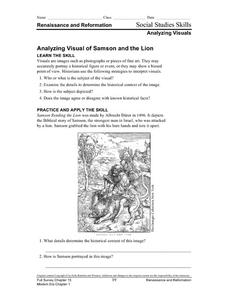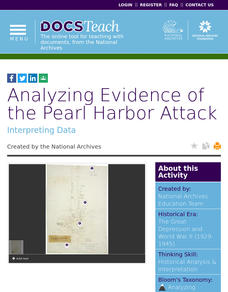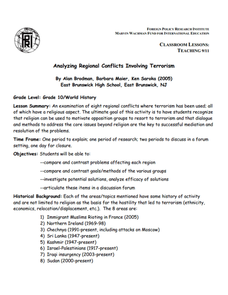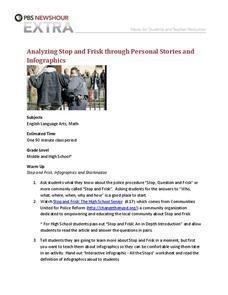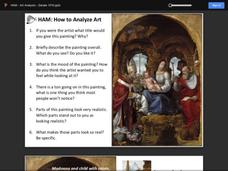Curated OER
SWOT Teams: Analyzing the Political Parties for the 2010 Midterm Elections
What are political parties and what so strategists do? In this political analysis lesson, students analyze political strategies to understand their strengths and weaknesses. They use key details from the text to learn how to create...
Roy Rosenzweig Center for History and New Media
Analyzing Political Campaign Commercials
Imagine a lesson that models for learners how to separate facts from opinions. How to detect bias. How to evaluate a source of information. How to identify propaganda. Although designed for middle schoolers, the activities in this packet...
Curated OER
Analyzing the Language of Presidential Debates
Scholars assess how word choice and linguistic patterns affect a presidential debate. They examine candidates' words for repetition and analyze what this repetition means. Then they locate countries that fit the expression free world. In...
Curated OER
A Day of Infamy:Analyzing FDR’s Pearl Harbor Address
In 1941 FDR spoke out on the events at Pearl Harbor. The class will get to analyze word choice, word meaning, author's craft and structure by analyzing an actual draft of this speech. They will look critically at the words used,...
University of Wisconsin
Analyzing Presidential Campaign Propaganda
Campaign propaganda has evolved from 1952 through the presidential election of 2008. A social studies activity prompts class members to analyze the devices used in ads and political cartoons, noting strategies they believe would work to...
Newseum
Media Mix-Ups Through History: Analyzing Historical Sources
Scholars use the E.S.C.A.P.E. (Evidence Source, Context, Audience, Purpose, Execution) strategy to analyze a historical source to determine why mistakes happen in news stories. They then apply the same strategies to contemporary flawed...
Newseum
Front Page Photographs: Analyzing Editorial Choices
Frontpage photographs are the focus of four activities that ask young journalists to consider what the images reveal about a newspaper and its community. To begin, groups compare what images different papers from across the country use...
Smithsonian Institution
Lexington and Concord: Historical Interpretation
Learners view and analyze three different images related to the Battle of Lexington and Concord. They also answer a variety of questions in a graphic organizer to help keep the information straight.
John F. Kennedy Presidential Library & Museum
Analyzing the Rhetoric of JFK’s Inaugural Address
“And so, my fellow Americans: ask not what your country can do for you—ask what you can do for your. country.” Did you know that John Kenneth Galbraith, Adlai Stevenson, and Theodore Sorensen helped John F. Kennedy craft his 1961...
Brown University
Analyzing the News
With so many ways to follow the news today, it is imperative to think critically about the sources of information we are turning to. Here is a fantastic graphic organizer that will help your learners develop the skills to...
National History Day
Propaganda Posters of World War I: Analyzing the Methods Behind the Images
The power of a picture. During the events surrounding World War I, propaganda posters were widely distributed in American society to sway the emotions of its citizens. By analyzing World War I propaganda posters in the first installment...
Curated OER
Analyzing Visual of Samson and the Lion
What strategies do historians use for interpreting visuals? This simple activity lists four questions that learners can use to approach and analyze historical photographs, fine pieces of art, etc., as well as an opportunity to apply the...
DocsTeach
Analyzing Einstein's Citizenship Application
Albert Einstein contributed greatly to America's history, but he wasn't always a citizen. An engaging activity analyzes Einstein's citizenship application to understand the process of immigration and how it impacts those trying to reach...
DocsTeach
Analyzing Evidence of the Pearl Harbor Attack
Don some detective caps and delve into the past to explore the evidence left behind after the attack on Pearl Harbor. An interesting activity uses primary sources to explore how the United States Navy was caught off guard and how the...
DocsTeach
Analyzing a Letter About Ford Pardoning Nixon
Out of the mouth of babes ... often times comes gems. The activity uses a letter written by a third-grader in 1974 regarding President Ford's pardon of Richard Nixon. Scholars analyze the letter, complete a worksheet, and participate in...
DocsTeach
Analyzing a Child Labor Photograph
Sometimes images tell shocking stories. Individuals examine a Lewis Hines picture of children packing beans and consider the impact working in a factory had on their young lives. A series of prompts emailed to the teacher helps them...
Curated OER
Analyzing Advertising
Some ads really make products look great, and even better than they really are! Kids get into small groups to research and compare marketing used by various cell phone companies. They analyze advertisements, carrier options, and cell...
ReadWriteThink
Analyzing Famous Speeches as Arguments
A speaker, a message, an audience. After analyzing these elements in Queen Elizabeth's speech to the troops at Tilbury, groups analyze how other speakers use an awareness of events, and their audience to craft their arguments....
Curated OER
How Do You Analyze a Corporation?
Students analyze corporation whose stock they may consider buying for the Global Stock Game (GSG).
National Council for the Social Studies
Analyzing a Product or Political Advertisement
How do advertisements evoke specific thoughts and feelings? Class members find out through the exploration of the Internet, videos, television, magazines, radio, and posters. Learners investigate commercial advertisements, political...
Foreign Policy Research Institute
Analyzing Regional Conflicts Involving Terrorism
This is a week-long lesson on analyzing the similarities and differences between sources of tension and terrorism in eight locations around the world. The class is divided into eight groups and assigned one of the locations to research....
PBS
Analyzing Stop and Frisk Through Personal Stories and Infographics
How much can you learn about an important topic from a single image? High schoolers analyze an infographic that represents the number of stops performed during the Stop and Frisk police procedure. After building background information...
Mr. Roughton
How to Analyze Art
How does analyzing art differ from analyzing text? Young historians consider a piece of Italian Renaissance art and practice another type of primary source analysis through a close look and discussion of Bernardo Zenale's...
Canadian War Museum
Analyzing Propaganda Posters
Understanding propaganda is very similar to understanding advertising's influence on an audience. Teach learners all about effective propaganda tactics by analyzing posters from World War I. Pupils work together to make their own posters...
Other popular searches
- Analyze Portraits
- Analyze Characterization
- Analyze Maps and Charts
- Analyze Setting
- Analyze Writing Technique
- Analyze Character
- Analyze Poetry
- Analyze Letter to Editor
- Analyze Information
- Analyze Facts
- Analyze Author's Use of Text
- Analyze Plot Development











